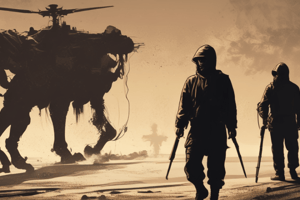Podcast
Questions and Answers
How do you understand the concept of human rights?
How do you understand the concept of human rights?
The rights held by all persons equally, universally, and forever.
Human rights are rights that apply to some people but not others.
Human rights are rights that apply to some people but not others.
False (B)
What is the legal basis of human rights according to the UN?
What is the legal basis of human rights according to the UN?
Article 55 of the UN Charter.
Which of the following are crimes against humanity?
Which of the following are crimes against humanity?
What is International Humanitarian Law?
What is International Humanitarian Law?
What does Geneva Law primarily focus on?
What does Geneva Law primarily focus on?
Which of the following categories of rights is designed to protect individuals accused of a crime?
Which of the following categories of rights is designed to protect individuals accused of a crime?
What is the Bill of Rights of the Philippines?
What is the Bill of Rights of the Philippines?
Flashcards are hidden until you start studying
Study Notes
Human Rights
- Human rights are inherent to all human beings without exception, regardless of race, sex, nationality, ethnicity, language, religion, or status.
- The Universal Declaration of Human Rights (UDHR) is the foundation of human rights law.
- The legal basis of the UDHR is Article 55 of the UN Charter.
- Human rights violations are also known as “crimes against humanity”.
- Crimes against humanity are specific crimes committed in large-scale targeting of civilians, for example: murder, torture, sexual violence, enslavement, persecution, enforced disappearance, etc.
- The International Criminal Court in The Hague investigates and prosecutes those accused of war crimes, crimes against humanity, and genocide.
International Humanitarian Law
- Also known as the Law of Armed Conflict (LOAC).
- Seeks to limit the effects of armed conflict based on humanitarian reasons.
- Based on two legal systems: the Geneva Law and the Hague Law.
Geneva Law
- Concerned with the protection of victims of war.
- Four Geneva Conventions are its core:
- Wounded and sick combatants on land.
- Wounded and sick combatants at sea.
- Prisoners of war.
- Civilians.
Hague Law
- Focused on the limitations of the means and methods of warfare.
Human Rights Law vs International Humanitarian Law
- Human rights law: deals with the rights individuals have toward their governments.
- International humanitarian law: deals with the rights individuals have during armed conflicts.
- Both systems aim to protect populations.
Classes of Rights
- Natural Rights: inherent in human beings and not granted by any government.
- Constitutional Rights: rights enshrined in a country’s constitution.
- Statutory Rights: rights created by legislation.
Classification of Constitutional Rights
- Political rights: give citizens power to participate in government.
- Civil rights: protect individuals from state interference.
- Social and Economic rights: ensure well-being and economic security.
- Rights of the accused: ensure the legal rights of individuals accused of crimes.
Bill of Rights
- The Philippines' Bill of Rights is a condensed version of the UDHR.
- It guarantees and enumerates individual rights and privileges.
- It acts as a charter of liberties for individuals and limits the power of the state.
Studying That Suits You
Use AI to generate personalized quizzes and flashcards to suit your learning preferences.




